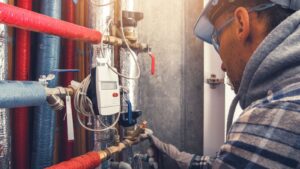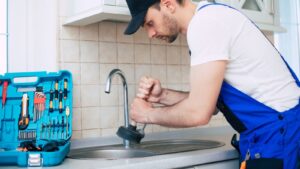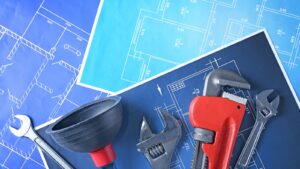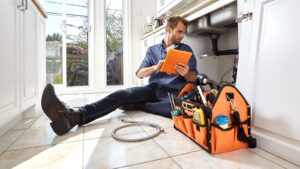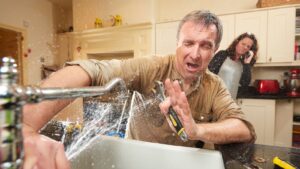Are you interested in pursuing a career in plumbing? Becoming a licensed plumber is essential to ensure that you are providing your clients with high-quality, safe work. In this blog post, we will guide you through the process of becoming a certified plumber in the United States. We will cover why it’s important to be a licensed plumber, the different types of plumbing certifications available and their requirements, as well as what you can expect on exam day. Additionally, we will provide tips on how to prepare for the plumbing exam and how to apply for a plumbing license. Whether you’re just starting out or are looking to advance your career, this guide is designed to help you succeed in the industry.
Why it’s important to be a licensed plumber
Protecting public health and safety is a top priority when it comes to plumbing work. This is why becoming a licensed plumber is so important. By obtaining proper certification, you are ensuring that plumbing work is done correctly and meets legal requirements in many states and municipalities. In addition to benefiting the public, being a licensed plumber also provides advantages for your career. You can access higher paying job opportunities, build trust with customers by demonstrating expertise and professionalism, and demonstrate commitment to ongoing education and training to maintain licensure. So whether you’re just starting out or looking to advance in the plumbing industry, becoming a licensed plumber is a crucial step towards success.
Understanding the different types of plumbing certifications
When it comes to plumbing certifications, there are several options to choose from depending on your experience level and career goals. A journeyman plumber certification is the first level of certification and requires a few years of experience and passing an exam. A master plumber certification is the next step up and requires additional exams and experience beyond a journeyman’s license. If you’re interested in starting your own business, a plumbing contractor license will allow you to do so legally. For those interested in specialized work, there are also certifications for backflow prevention testers and medical gas installers. Understanding the different types of certifications available can help you determine which path to take in your plumbing career.
Journeyman plumber
Embarking on the journey towards becoming a licensed plumber can be daunting, but obtaining a Journeyman Plumber certification can be an important step in advancing your career. By completing several years of apprenticeship and passing state or local licensing exams, journeyman plumbers gain the expertise to work independently under the supervision of a master plumber. Not only does this certification lead to higher paying job opportunities, but it also provides a pathway for becoming a master plumber in the future. However, it’s essential to research specific requirements for journeyman plumber certification in your state and stay up-to-date with industry standards through continuing education to maintain licensure.
Master plumber
Becoming a Master plumber is no easy feat, but the rewards are worth the effort. With several years of experience as a journeyman plumber and passing a rigorous exam, Master plumbers are qualified to design, install, and repair complex plumbing systems. Employers often prefer to hire them for their expertise and ability to handle difficult plumbing challenges. They are also authorized to supervise other plumbers and apprentices, which makes them an essential part of any plumbing team. The knowledge gained from becoming a Master plumber can lead to better job opportunities and higher pay, making it a worthwhile investment in your career.
Plumber gas license
Working with gas lines and appliances can be dangerous, which is why having a plumber gas license is essential for those in the plumbing industry. This type of certification requires additional training and testing beyond a standard plumbing license, ensuring that plumbers are well-equipped to handle potentially hazardous situations. Obtaining a plumber gas license can also lead to more job opportunities and higher earning potential. However, it’s important to note that requirements for this certification may vary by state, so it’s crucial to research local regulations before pursuing this path. Keeping up-to-date on safety regulations and continuing education is crucial for maintaining a plumber gas license and ensuring the safety of yourself and others.
Plumber utility license
When it comes to plumbing, working on water and sewer lines that connect to the public system is a specialized job that requires additional certification. This is where a plumber utility license comes in. To obtain this license, one may have to complete a training program or pass an exam, depending on the state or location. Having a plumber utility license not only increases earning potential but also allows for more specialized work opportunities. Be sure to research the specific requirements for obtaining this certification in your area before pursuing it.
Requirements for becoming a licensed plumber
Becoming a licensed plumber requires completing specific education and training requirements, passing an exam, and obtaining liability insurance or bonding. The education and training requirements vary by state but typically involve completing an apprenticeship program or vocational school, followed by on-the-job experience. Some states may have additional requirements beyond education and work experience, such as passing a licensing exam or carrying insurance. It’s crucial to research the specific requirements in your state before pursuing certification as a plumber, as they can vary widely. Additionally, many states require continuing education to maintain licensure as a plumber.
Education and training
Completing the necessary education and training requirements is an essential step towards becoming a licensed plumber. Typically, this involves obtaining a high school diploma or equivalent and completing an apprenticeship program that combines on-the-job training with classroom instruction. Depending on where you live, vocational school or college courses in plumbing design or construction may also be required. One of the key benefits of pursuing an apprenticeship is the opportunity to work alongside experienced plumbers, learning from their expertise and building practical skills that can’t be taught in a classroom setting. Additionally, continuing education is often necessary to maintain licensure and stay up-to-date with industry changes.
Apprenticeship
Becoming a licensed plumber requires rigorous training and on-the-job experience, making the apprenticeship an essential step in the process. An apprenticeship program typically takes between four to five years to complete and consists of both classroom instruction and hands-on training. During this time, aspiring plumbers learn about plumbing systems, codes, installation techniques, repair procedures, and safety protocols. They also gain practical experience working alongside experienced professionals, which allows them to develop the skills necessary for a successful career as a licensed plumber. Apprenticeships may be paid or unpaid depending on the program and state regulations.
Work experience
Gaining work experience is an essential requirement for becoming a licensed plumber in most states. This experience enables aspiring plumbers to acquire the practical skills needed to do the job effectively and efficiently. Besides, it provides them with hands-on experience working with plumbing systems. Most states require a specific number of hours of on-the-job training or apprenticeship with licensed plumbers. This enables applicants to learn the practical skills necessary for the job and gain hands-on knowledge working with different types of plumbing systems. Additionally, some states require applicants to pass an exam that tests their knowledge of plumbing codes, safety regulations, and best practices before they can be licensed. Building up work experience also helps plumbers establish themselves in the industry and build a reputation for quality workmanship.
Passing the plumbing exam
Earning a plumbing license requires passing an exam that tests your knowledge of the trade. The exam covers various topics, such as proper installation practices, safety regulations, and plumbing codes. To increase your chances of success on the exam, it’s important to thoroughly prepare beforehand. Familiarize yourself with the exam format and content, study plumbing codes and regulations, take practice exams, and consider enrolling in exam prep courses. With diligent preparation and a solid understanding of the material, you can pass the plumbing exam and take the next step towards becoming a licensed plumber.
How to prepare for the plumbing exam
Preparing for the plumbing exam is crucial for becoming a licensed plumber. To ensure that you are fully prepared for the exam, there are several things you can do. Firstly, review the content outline to understand what topics will be covered in the exam. This way, you can focus your study efforts and make sure you cover all necessary material. Additionally, use study materials and resources provided by professional organizations or the exam administrator.
Taking practice exams and quizzes can help you assess your knowledge and identify areas where you need additional review. It’s also important to be familiar with plumbing codes and regulations in your state or local area. Finally, consider taking a prep course or working with a tutor to ensure that you are fully prepared for the exam. With thorough preparation, you can increase your chances of success on the plumbing exam and take an important step towards becoming a licensed plumber.
Familiarize yourself with the exam format
Just like any other exam, familiarizing yourself with the format is crucial when it comes to the plumbing exam. The exam typically consists of multiple-choice questions, which can be quite different from practical plumbing work. To prepare for this, you can find practice exams and study materials online that will help you get a sense of what the actual test will be like. Be sure to take note of time limits and specific instructions or rules for the exam. Knowing what to expect in advance can help you feel more confident and prepared on exam day, increasing your chances of passing and becoming a licensed plumber.
Study plumbing codes and regulations
Familiarizing oneself with plumbing codes and regulations is a crucial component of becoming a licensed plumber. Plumbing codes and regulations differ by state and locality, so it is essential to study the specific ones that apply to your area. The Uniform Plumbing Code, International Plumbing Code, and local amendments are among the commonly studied plumbing systems and their components. Additionally, interpreting plumbing schematics and blueprints is a vital skill that aspiring plumbers must acquire. Utilizing online resources and practice exams can be incredibly helpful in preparing for the exam.
Take practice exams
To increase your chances of success on the plumbing certification exam, it’s essential to take practice exams. These exams can help you identify areas where you need improvement and build confidence in your knowledge. There are many online resources that offer practice exams for the plumbing exam, which simulate the actual test-taking experience. By taking practice exams, you can get used to the format of the questions and reduce anxiety on test day. Make sure to review the questions you missed and understand why you got them wrong. Taking multiple practice exams can also help you become more comfortable with the material and increase your chances of passing the actual exam.
Consider exam prep courses
Improving your chances of passing the plumbing exam can become a lot easier with the help of exam prep courses. These courses offer you access to comprehensive study materials, practice tests, and guidance from experienced instructors. Whether you prefer in-person classes or online courses, there are many options available that cater to your specific needs. While taking an exam prep course requires additional investment, it can save you time and money in the long run by helping you pass the plumbing exam on your first try. Before enrolling in a course, be sure to research different options and compare their costs and benefits to make an informed decision.
Is it illegal to do plumbing work without a license?
In most states, performing plumbing work without a license is illegal. This is because obtaining a plumbing license involves completing the necessary education and training required to ensure public safety. The licensing process typically involves passing an exam and meeting other requirements such as background checks and insurance. While it may be tempting to perform plumbing work without a license, doing so can result in legal consequences and even harm to those involved, making it crucial to obtain the proper certification. Additionally, having a plumbing license can increase job opportunities and earning potential in the field.
How to apply for a plumbing license
Applying for a plumbing license can be overwhelming, but it’s essential to understand the process and requirements. Each state has specific licensing requirements, so researching your state’s regulations is crucial before applying. Meeting education and experience requirements may involve completing an apprenticeship program or obtaining a degree in plumbing. Once you have fulfilled the prerequisites, submit your application with the appropriate licensing board. This usually involves submitting required documents and fees, scheduling an exam, and passing both written and practical components. Remember to maintain your license by meeting continuing education and renewal requirements to ensure that you can keep practicing as a licensed plumber.
Check your state’s requirements and application process
To become a licensed plumber, it’s crucial to understand the specific requirements in your state. Each state has its own set of qualifications and exams that need to be met before obtaining a plumbing license. Therefore, it’s essential to check with your state’s licensing board to find out the exact prerequisites for applying for a license. Some states may require a certain amount of apprenticeship or work experience before you can even begin the licensing process. Additionally, you’ll need to fill out an application and pay any fees required by your state. Once you’ve submitted your application, prepare for your exam and ensure that you meet all necessary education and experience requirements. It’s important to stay updated on any continuing education requirements once you have obtained your plumbing license as well.
Gather required documents and fees
To apply for a plumbing license, it’s essential to gather all the necessary documents and fees. In most states, this includes proof of completion of an apprenticeship program or trade school, passing a competency exam, and providing liability insurance. Fees associated with obtaining a plumbing license can vary by state and may include application fees and exam fees. Some states may even require background checks before issuing a license. To avoid delays in the application process, it’s crucial to research your state’s specific requirements and ensure that you have all the documentation and fees ready before submitting your application.
Submit your application and schedule your exam
After gathering all the required documents and fees, it’s time to submit your application and schedule the exam. Before submitting your application, make sure you have met all the requirements for obtaining a plumbing license in your state. The application process typically involves providing proof of education and experience, passing a background check, and paying a fee. Once your application is approved, you can schedule your exam through the licensing board or third-party testing agency. It’s important to prepare for the exam by studying relevant plumbing codes and regulations. Passing the exam is a crucial step towards becoming a certified plumber and pursuing a successful career in the field.
What to expect on exam day
Being well-prepared for the plumbing exam can significantly reduce stress and increase your chances of success. Arriving early, bringing all necessary materials, and managing your time wisely are all important steps to ensure a smooth exam experience. Additionally, prioritizing questions based on difficulty level and taking breaks as needed can help you stay focused and refreshed throughout the exam. With careful preparation and a calm mindset, you’ll be able to tackle even the most challenging exam questions with confidence and ease.
After getting your plumbing license
Becoming a licensed plumber is an impressive achievement that opens up a world of opportunities in the plumbing industry. After obtaining your plumbing license, the next step is to continue building your skills and expertise in the field. Joining a professional plumbing association is a great way to stay informed about industry trends and regulations while connecting with other professionals in the field. It’s also important to consider pursuing additional certifications or specializations to stand out from the competition and expand your career opportunities. Continuing education through ongoing training and workshops will help you stay up-to-date with the latest techniques, materials, and technologies used in plumbing projects. By staying current and actively involved in the industry, you can ensure a successful and rewarding career as a licensed plumber.
Continuing education requirements
As a licensed plumber, it is crucial to stay current with the latest industry trends and regulations. Continuing education requirements vary from state to state, but most require plumbers to complete a certain number of hours of coursework or on-the-job training. These courses can help plumbers stay up-to-date with the latest technologies and techniques, ensuring they provide the best service possible to their customers. In addition, pursuing additional certifications or specializations through continuing education can help plumbers expand their skills and expertise, creating new opportunities for career advancement. It’s essential to stay on top of continuing education requirements to maintain your license and ensure you’re offering top-quality service as a certified plumber.
Renewal process for your license
Maintaining a valid plumbing license is essential for any professional in the field. However, obtaining and renewing a license requires fulfilling specific requirements laid out by your state’s licensing board. To renew your plumbing license, you will need to complete continuing education courses or pass an exam, depending on your state’s regulations. Avoid letting your license lapse by keeping track of its expiration date and starting the renewal process early. Certain states may also require plumbers to maintain liability insurance or meet other requirements to keep their license current. By staying on top of these obligations, you can continue working legally as a plumber while maintaining your credibility as a licensed professional in the industry.
Conclusion
Becoming a licensed plumber is a fulfilling career choice that requires dedication and hard work. It’s important to obtain the necessary certifications to ensure that you are legally allowed to perform plumbing work. This guide has outlined the different types of plumbing certifications, the requirements for becoming a licensed plumber, how to prepare for the plumbing exam, and what to expect on exam day. Remember, it’s illegal to do plumbing work without a license, so make sure you go through the proper channels to obtain your license. Once you have obtained your license, be sure to keep up with continuing education requirements and renew your license as needed. If you’re ready to take the first step in becoming a certified plumber, check out our resource guide for more information.

